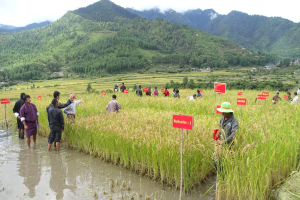Summary
Bhutan has only seven confirmed COVID-19 positive cases as on 3 May 2020. However, the pandemic has exposed the consequences of its dependence on food imports. To make Bhutan self-reliant in food production, the Bhutanese government wants to use this crisis as an opportunity to boost the country’s agriculture sector.
After the first COVID-19 positive case was detected on 6 March 2020, one of the early measures Bhutan took to mitigate its spread in the country was to seal all its international land borders on 23 March 2020. Subsequently, Bhutan banned the import of some selected products such as betel leaf and betel nut, and ordered all essential imports to undergo Coronavirus containment related protocols at the border entry points.
This paper discusses the impact of COVID-19 on Bhutan’s tourism and agriculture sectors. It is forecasted that tourism will witness an adverse impact while the pandemic is seen as an opportunity to attain self-sufficiency in food production.
Impact on Tourism
In 2018, Bhutan received a total of 274,097 tourists, an increase of 7.61 per cent from 2017. Of the total visitors, 202,290 were from regional countries (India, Bangladesh and the Maldives) and 71,807 came from outside South Asia. The total gross earning of this sector in that year was US$85.41 million (S$1.13 billion) which was seven per cent more than that in 2017.
COVID-19 will affect the earnings of Bhutan’s tourism sector in 2020-21. Due to the outbreak of the pandemic, between 15 January and 23 March 2020, 2,550 international tourists cancelled their trip to Bhutan and the country incurred a loss of about US$4.4 million (S$6.2 million). This amount excludes the cancellation of trips by regional tourists.
Moreover, this loss in the tourism sector has affected the livelihoods of about 50,000 people engaged in this and allied sectors. If one counts the number of dependents, approximately 150,000 people have been affected in these sectors. At the same time, the business of about 1,000 hotels has been severely hit by the pandemic.
Opportunity for the Agriculture Sector
Bhutan is largely dependent on India for the import of cereals, fruits, vegetables and meat. In 2019, Bhutan imported 84,584.45 million tonnes (MT) of rice (an increase by 18 per cent from 2018), 4,893.12 MT of wheat and meslin (an increase by almost 59 per cent from 2018), 4.31 MT of rye (an increase by about 75 per cent from 2018), 15, 924.59 MT of maize, (a decrease by about 27 per cent from 2018), 122.09 MT of buckwheat (an increase by one per cent from 2018) and 17.11 MT of other cereals (a decrease by 57 per cent from 2018).
The COVID-19 containment protocols established at the border entry points have affected the speed of imports from India. Many trucks have been stuck at these entry points due to the longer period of clearance and transfer of goods from Indian to Bhutanese vehicles. There is a shortage of labourers as many have left or were told to leave due to COVID-19. For example, in Phuentsholing, a border town in Bhutan, jobless youths have replaced those regular labourers. Due to such problems, it is taking longer for imported food to reach local shops. This has caused some Bhutanese to engage in panic buying despite reassurances from the government that the country has enough food stock for the next six months.
For the government, the COVID-19 crisis can be used as an opportunity to achieve self-sufficiency in food production. Speaking on this matter to thirdpole.net, Bhutan’s Minister for Agriculture, Yeshey Penjor, said, “[The] lockdown in India and the closure of border gates with India has given our farmers the opportunity to substitute a large portion of the country’s vegetable and meat requirement that are imported from India… We take the Covid-19 pandemic as a blessing in disguise and the pandemic had called for a test of sustainability.” The minister also said, “To motivate farmers, we have talked with [the] Prime Minister to start with the cottage and small industry bank, which would provide loans at the minimum or zero interest rates… [for] land resurfacing and development support and direct inputs such as seeds, electric fences and technical support.”
Earlier to promote agriculture, the Bhutanese government allocated Nu1 billion (S$18 million) in its 2019 budget for its flagship programme on organic farming which is now getting a lot of political support in the country.
Conclusion
To fight against the impact of COVID-19, the National COVID-19 Response fund was set up on 9 March 2020. Bhutan has been also helped by India and other international institutions. India also sent a medical team and supplies to Bhutan. In April 2020, Bhutan and the World Bank signed a fast-track US$5 million (S$7.7 million) COVID-19 Emergency Response and Health Systems Preparedness Project to help the Himalyan mountain kingdom prevent, detect, and respond to the COVID-19 pandemic as well as strengthen its public health preparedness. In order to store food, the United Nations World Food Programme, has donated two mobile storage units to Bhutan.
While the tourism sector will be badly affected by COVID-19, Bhutan can turn the pandemic into an opportunity by achieving self-sufficiency in food production and boost agricultural activities.
. . . . .
Dr Amit Ranjan is Research Fellow at the Institute of South Asian Studies (ISAS), an autonomous research institute at the National University of Singapore (NUS). He can be contacted at isasar@nus.edu.sg. The author bears full responsibility for the facts cited and opinions expressed in this paper.
-
 More From :
More From :
-
 Tags :
Tags :
-
 Download PDF
Download PDF



